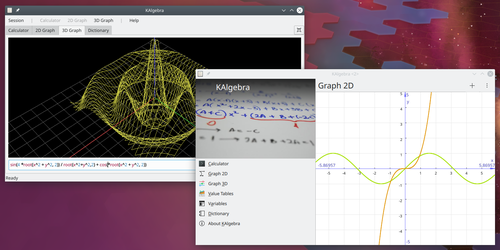KAlgebra: Difference between revisions
(Corrected link) |
|||
| (63 intermediate revisions by 6 users not shown) | |||
| Line 17: | Line 17: | ||
==First Steps with KAlgebra== <!--T:5--> | ==First Steps with KAlgebra== <!--T:5--> | ||
<!--T: | <!--T:11--> | ||
Here | Here are some tutorials: | ||
* [[Special:myLanguage/KAlgebra/Console Tab| Using the console tab]]. | |||
* [http://tutorial.downloadatoz.com/kalgebra.html Drawing 3D Graphs] | |||
<!--T: | <!--T:12--> | ||
Another resource that is useful in learning more about '''KAlgebra''' is the <menuchoice>Dictionary</menuchoice> tab. It contains examples of every function supported by '''KAlgebra'''. Maybe the best way to learn how to do things with '''KAlgebra'''. | |||
==Screenshots== <!--T:13--> | |||
<!--T:14--> | |||
Here you can see some [[Special:myLanguage/KAlgebra/Screenshots|screenshots]] | |||
==Documentation== <!--T:15--> | |||
<!--T:16--> | |||
* [https://docs.kde.org/stable/en/kdeedu/kalgebra/index.html The KAlgebra Handbook] | |||
<!--T:21--> | |||
* [http://swiftscythe.blogspot.com/2011/02/how-to-work-with-complex-numbers-in.html How to work with complex numbers in KAlgebra] | |||
==Other== <!--T:17--> | |||
<!--T:18--> | |||
* [[Special:myLanguage/KAlgebra/Homework|Homework]] is a page which show some uses of KAlgebra in real world. | |||
The | <!--T:19--> | ||
* [http://edu.kde.org/applications/school/kalgebra/ The Project Page] contains further helpful links, including links needed for bug reporting or contacting the authors. Here you will find information about mailing lists and the IRC channel. | |||
<!--T:20--> | |||
<!--T: | |||
[[Category:Education]] | [[Category:Education]] | ||
</translate> | </translate> | ||
Revision as of 16:04, 15 October 2014
Home » Applications » Education » KAlgebra

|
KAlgebra is a calculator with symbolic and analysis features that lets you plot 2D and 3D functions as well as to easily calculate mathematical expressions. It is part of the KDE Education Project. |

First Steps with KAlgebra
Here are some tutorials:
Another resource that is useful in learning more about KAlgebra is the tab. It contains examples of every function supported by KAlgebra. Maybe the best way to learn how to do things with KAlgebra.
Screenshots
Here you can see some screenshots
Documentation
Other
- Homework is a page which show some uses of KAlgebra in real world.
- The Project Page contains further helpful links, including links needed for bug reporting or contacting the authors. Here you will find information about mailing lists and the IRC channel.
